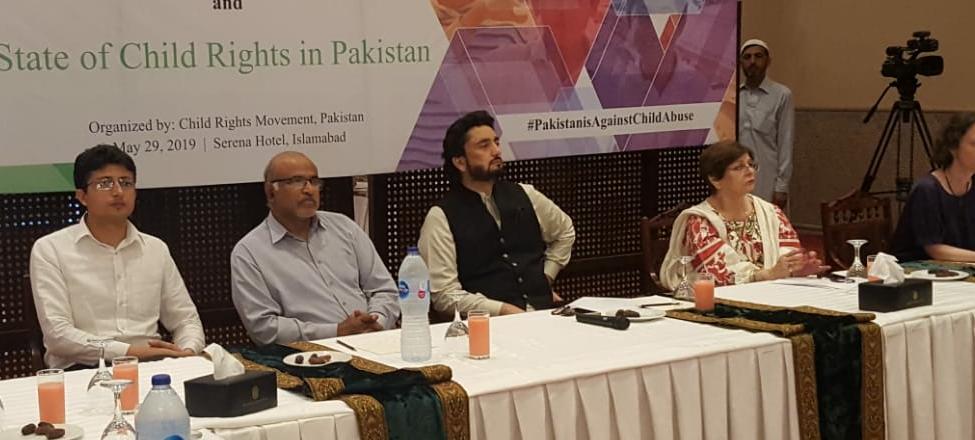Islamabad May 29, 2019: The Child Rights Movement (CRM) Pakistan is a coalition of more than 500 NGOs and concerned individuals working for the promotion and protection of child rights in Pakistan.
Looking into the current situation of child rights violations, CRM organized a seminar on legislative development and state of child rights in Pakistan.
The key speakers of the seminar urged for proper implementation of child rights-related laws and showed great concerns over the increasing cases of violence against children.
In the same occasion, CRM and all civil society members and organizations launched a national campaign Pakistanis Against Child Abuse (PACA).
National launch will be followed by the Provincial launches by all the Chief Ministers and then District level launches by the Deputy Commissioners so that the campaign reaches out every corner of the country.
Speaking to the audiences Minister of State for Safron Shehriyar assured that the government is aware of the rights of children and recently increased issues of child rights violation.
Prime Minister Pakistan also expressed concerns on this situation. It is our prime agenda that no child in Pakistan is suffering from violence, exploitation, and child right related problems.
He emphasized on Civil Society’s role to identify and resolve these problems. Children are the future of Pakistan and we can go to any extent to protect them. Minister for the state also ensured to support the campaign Pakistanis Against Child Abuse for a broader level of awareness.
Executive Director Sahil Manizeh Bano said that the poor implementation of child rights related laws is the biggest challenge for providing a safe secure and protected environment for children. Every day more than 10 children are abused in Pakistan and the situation is going to worst day today.
She also emphasized to educate children in homes and schools about body safety and child protection techniques. She also emphasized government and particularly the work of police, courts and other organizations to make sure that the law enforcement should be done.
She urged on preventive actions and use of child protection mechanism widely in the whole country. Ethical measures and curriculum should also be compatible with modern needs.
Despite the death sentence to the culprit of Zainab’s killer in a short time, rising in the cases of sexual violence indicates that the child protection system needs to be strengthened.
Valerie Khan, Executive Director, Group Development Pakistan stated that children rights in Pakistan had probably never been seen as a governance priority to this level before.
She explained the fact that children deserved to avail and exercise their fundamental rights in accordance with Pakistani national and international legal obligations had gained strong momentum. Some encouraging steps have been taken by the government to better enforce child rights.
Yet, the situation remains highly challenging: millions of children are still out of school, 21% of girls are married before 18 years of age.
The infant mortality rate is exponential, stunting still prevails, violence against children is increasingly reported. To address the Child Rights situation, the government response is too often emotional and disorganized, not relying on evidence and research which unfortunately leads to ill-informed and hence inefficient policies.
We mean well, we do wrong. It is, therefore, crucial to ensure that the government links with technical experts and civil society to devise review and finalize, rational and adequate plans of actions that focus on the best interest of the child and therefore the best interest of Pakistan.
Enforcing children’s rights is not only our moral duty. It is also a matter of geo-strategic interest which requires relevant resource allocation as well as a holistic, multi-agency systemic approach tailored to the Pakistani context”.
For this purpose we need to invest in the implementation of the National Commission on the Rights of the Child Act 2017, the ICT Child Protection Act 2018, the Juvenile Justice System Act 2018 and respective provincial child protection laws in Pakistan.
The concluding observations of UN Committee on the CRC exposed numerous delinquencies on Pakistan’s part — ranging from the inability of the state to legislate in favor of children, barriers to enforcement of child laws and weak coordination among stakeholders.
Mahmood also requested from the participants to support the campaign #PakistanisAgainstChildAbuse in social media.
Child Rights Expert Dr. Syed Safdar Raza said that budgetary allocation is the key and CRM Pakistan hopes that the coming budget will have a special focus on children as without focusing on child rights and allocating resources for children, Pakistan will not be able to progress or prosper.
Moreover, he also highlighted the need for strict implementation of the Article 25-A in the federal capital and requested the Prime Minister to strictly monitor implementation of the ICT Right to Free and Compulsory Education Act 2012 to ensure that no child is out of school in the federal capital where we still see children working in hazardous conditions, begging on the streets and traffic signals.
Given the gravity of the situation, parliament should be central in creating political will and coordinating with provinces and institutions for oversight of legislative implementation and to honor the CRC.
After the 18th amendment, provinces in Pakistan have been largely authorized for legislation but still, there is a lot to do with legislation.

